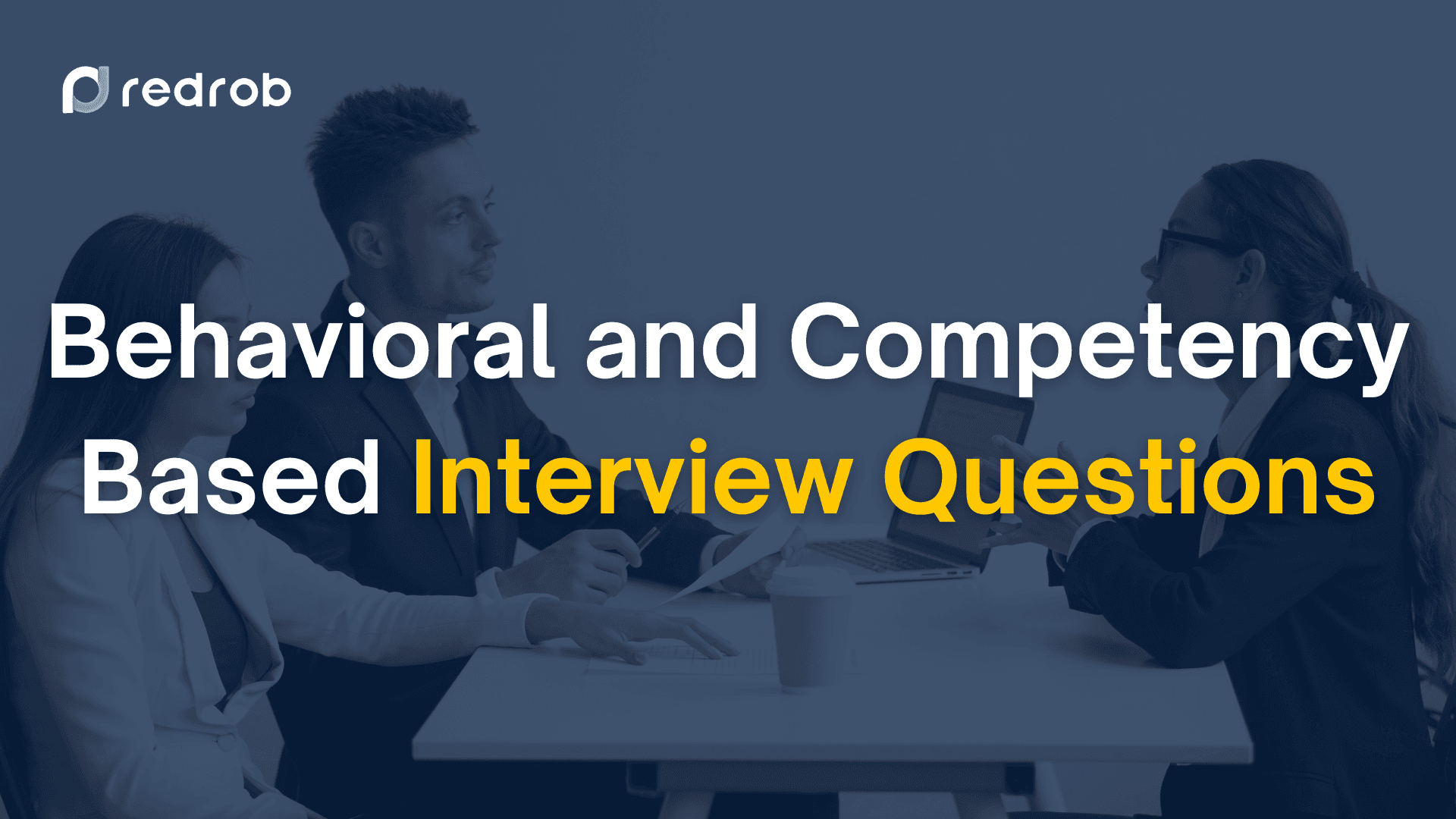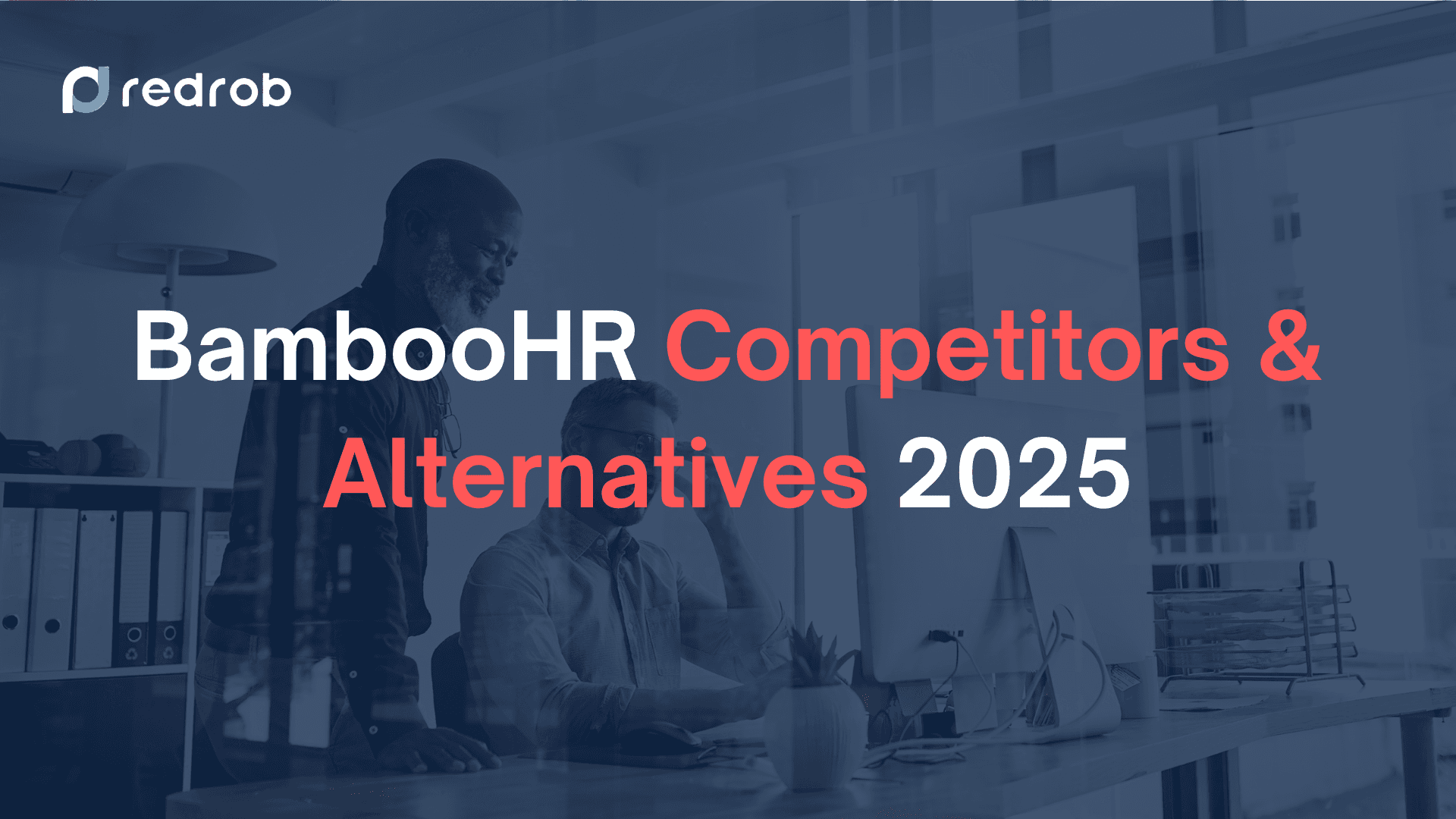Behavioral Competency
8 mins read
•
Oct 24, 2024

Soumyata Singh
Preparing for an interview can feel overwhelming, especially when behavioral and competency based interview questions come into play. These questions are designed to test more than just your skills—they assess how you respond in real-world situations. But don’t worry, mastering them isn’t as hard as it seems. By understanding what interviewers look for, you can stand out and showcase your strengths confidently. Ready to learn how to handle these questions like a pro? Keep reading to make sure you’re fully prepared for your next interview.
Understanding Behavioral and Competency-Based Interview Questions
Behavioral and competency based interview questions are designed to evaluate how you performed in past situations. Interviewers want to see how your past behavior reflects your skills and predict your future performance. These questions are crucial in determining if you’re the right fit for the job.
Key Differences and Similarities Between Behavioral and Competency Questions
While both types of questions assess your abilities, they focus on different aspects. Behavioral questions ask about your actions in specific scenarios—how you handled a problem or situation in the past. Competency questions, on the other hand, are more skill-specific. They target abilities like communication, leadership, or problem-solving. Both question types aim to assess your capabilities, but behavioral questions focus on past actions, while competency questions focus on specific skills.
Importance for Interviewers to Assess Fit and Skill Level
Interviewers ask behavioral and competency based interview questions to assess how well you fit the role. They want to see if your skills and behavior match the job’s requirements. Studies show that structured interviews, which often include these questions, determine hiring decisions significantly. Your answers help interviewers predict how you might perform in the role, ensuring they hire someone with the right skills and mindset.
Moving further, let’s explore the different categories of behavioral interview questions you might have to answer.
Categories of Behavioral Interview Questions
Behavioral interview questions help employers understand how you’ve handled situations in the past. They reveal your skills in real-world scenarios. Below, we’ll break down some common categories of behavioral questions you might face during interviews.
1. Time Management: Handling Multiple Deadlines and Long-Term Project Management
Time management questions assess how well you prioritize tasks. Employers want to know how you balance competing deadlines while managing long-term projects. For example, you may be asked, “Can you describe a time when you had to meet multiple deadlines?” Answering effectively shows that you’re organized and reliable. In fact, studies show that good time management boosts productivity by 25%.
2. Communication Skills: Managing Disagreements and Persuasion
Questions about communication focus on how you manage disagreements or persuade others. Employers might ask, “Describe a situation where you resolved a conflict at work.” This shows your ability to handle difficult conversations and influence others. It also plays a role in negotiations or client interactions.
3. Adaptability: Adjusting to Changes and Handling Pressure
Adaptability questions are common in fast-paced industries. They assess how well you adjust to changes or handle high-pressure situations. For instance, you may be asked, “Tell me about a time when you had to adapt quickly to changes.” Your ability to stay calm and flexible in challenging circumstances is key.
4. Leadership: Motivating and Delegating in Teams
Leadership questions test your ability to guide and motivate a team. Employers may ask, “Can you give an example of when you successfully led a team?” Strong leadership requires delegation and clear communication. Effective leadership helps improve team performance.
5. Problem Solving: Creative Solutions and Initiative in Challenging Situations
Problem-solving questions assess your creativity and initiative. A common question is, “Tell me about a time when you faced a difficult problem and how you solved it.” This helps employers gauge how you tackle unexpected challenges. Creative solutions often come from a mix of critical thinking and innovation.
6. Teamwork: Collaborating Effectively and Handling Conflicts
Teamwork questions reveal how well you collaborate with others. You may be asked, “Describe a time when you had to work with a difficult team member.” Answering these questions well shows you can resolve conflicts while maintaining team harmony. If you're part of a hiring process, understanding how much recruitment software costs could involve coordinating with teams across departments.
7. Client Interaction: Impressive Service and Managing Expectations
Client interaction questions focus on your ability to manage expectations and deliver great service. Employers might ask, “Tell me about a time when you handled a difficult client.” Your response demonstrates your customer service skills and professionalism.
As you prepare for these questions, understanding the various competencies being tested is crucial. The next section is all about it.
Categories of Competency-Based Interview Questions

Competency-based interview questions are designed to evaluate specific skills required for a job. Employers use these questions to see how you apply certain competencies in real-world situations. Below, we’ll break down the most common competencies you might be assessed on.
Common Competencies
These five competencies—adaptability, communication, leadership, problem-solving, and teamwork—are the foundation of most roles. Interviewers will often ask you to show how you demonstrate these skills. For example, “How did you adapt to unexpected changes in your previous job?” is a question aimed at understanding your adaptability.
Similarly, questions around leadership might ask, “How have you led a team to achieve a challenging goal?”
How Questions Target Specific Skills and Competencies
Competency-based questions are crafted to target key skills. They help interviewers understand how you think and act in specific situations. For example, communication-related questions might focus on how you convey complex ideas. Leadership questions assess how you inspire and direct others. Each question is an opportunity for you to showcase your expertise in a particular skill.
Studies have shown that structured competency-based interviews are 50% more predictive of job success. These questions help employers pinpoint whether you possess the necessary abilities for the role.
Example Question Structures
Here are a few example questions to help you:
Tell me about a time you had to adjust to sudden changes at work.
Describe a situation where you had to explain a complex idea to a non-technical person.
How have you motivated a team to meet an important deadline?
Can you share a time when you solved a problem no one else could?
Give an example of how you worked effectively in a group setting.
Your answers to these questions give employers insights into your working style. Addressing competencies with solid examples can set you apart from other candidates.
How to Answer Behavioral and Competency Questions
Answering behavioral and competency based interview questions effectively requires structure and thoughtfulness. Employers want clear, concise answers that highlight your relevant skills. Below are some key strategies to help you stand out.
1. Use the STAR Method: Situation, Task, Action, Results
The STAR method is an excellent way to answer both behavioral and competency-based questions. It helps you organize your responses in a logical and concise manner:
Situation: Briefly explain the context. For example, describe a specific work situation or challenge you faced.
Task: Outline the responsibilities or goals you had in that situation.
Action: Describe the steps you took to address the task. Focus on your actions.
Results: Share the outcome of your actions. Highlight what you accomplished or learned.
Example: “I was tasked with organizing a recruitment drive. The challenge was meeting the tight deadline (Situation and Task). I coordinated with various departments, prioritized tasks, and managed external vendors (Action). The drive was a success, filling 95% of open positions on time (Result).”
2. Choose Appropriate Examples Related to Job Role
Always choose examples that relate to the job you’re applying for. Focus on skills that match the job description. For instance, if you’re applying for a leadership role, choose examples that show your ability to motivate and manage a team. If teamwork is key, highlight a project where collaboration was critical to success. Tailoring your examples makes your answers more relevant and increases your chances of impressing the interviewer.
3. Avoid Scripted Answers and Ensuring Authenticity
It’s easy to sound rehearsed when preparing for an interview, but authenticity is vital. Avoid memorizing responses word-for-word. Instead, focus on key points you want to cover. Speak naturally, and let your personality shine through. Employers value candidates who are honest and genuine.
Make sure your answers reflect your true experiences. Being authentic allows you to connect better with interviewers and shows confidence in your abilities.
Now, we’ll explore sample behavioral and competency questions along with model answers to help you practice.
Sample Questions and Model Answers
Knowing how to answer common behavioral and competency-based interview questions is essential. Below are examples of how you can respond to different scenarios, using clear and effective strategies.
1. Teamwork and Collaboration Scenarios
Teamwork questions often assess how well you work with others. An interviewer might ask, “Can you describe a time when you worked successfully in a team?”
Sample Answer: “I was part of a team tasked with launching a new product. We had a tight deadline and needed to collaborate efficiently. I organized regular meetings to ensure open communication and delegated tasks based on each member’s strengths. As a result, we launched the product two weeks ahead of schedule, exceeding company expectations.”
Strong teamwork involves clear communication and collaboration.
2. Handling Conflict and Resolving Disagreements Effectively
Conflict resolution is a key skill in any workplace. You might be asked, “Tell me about a time when you resolved a conflict within a team.”
Sample Answer: “In one project, two team members disagreed on the project direction. I stepped in to mediate, ensuring both parties shared their concerns. After listening to both sides, we found a compromise that integrated both perspectives. This resolved the conflict, and we completed the project successfully, earning praise from management.”
Handling conflict well shows emotional intelligence and leadership potential.
3. Showcasing Leadership Through Initiative and Delegation
Leadership questions often focus on how you manage people and delegate tasks. You could be asked, “Describe a time when you demonstrated leadership in a challenging situation.”
Sample Answer: “As a project manager, I noticed a lack of direction during a critical phase. I took the initiative to set clear goals and delegated tasks based on team strengths. I also ensured regular updates to keep everyone on track. My leadership helped us finish the project 10% under budget and ahead of time.”
Leadership is about guiding the team and ensuring efficiency.
4. Problem-Solving and Creative Thinking
Employers want to see how you solve problems creatively. A common question is, “Can you tell me about a time when you had to solve a difficult problem?”
Sample Answer: “During a major product launch, we encountered a last-minute technical issue. I quickly gathered the team to brainstorm solutions. We decided on a workaround that allowed us to fix the issue without delaying the launch. The product went live on time, and we received positive feedback from both the client and users.”
Problem-solving questions show your ability to think critically and act under pressure.
Now that you’ve seen how to structure your answers, let’s look at how you can prepare for these types of questions in advance.

Preparation Tips for Behavioral and Competency Interviews
Preparing for behavioral and competency based interview questions is key to making a strong impression. The following tips will help you get ready and present yourself confidently during the interview.
1. Research Job Description and Align Examples
Before your interview, carefully review the job description. Identify the key skills and competencies the employer is seeking. Make sure the examples you plan to use in your answers align with these requirements. If the role emphasizes teamwork, leadership, or problem-solving, choose examples that showcase those traits. This targeted approach will demonstrate that you understand the job and have relevant experience.
2. Practice with STAR Method Responses
Practice using the STAR method to structure your answers. Prepare specific situations for each competency likely to come up in the interview. Outline your responses, keeping the situation, task, action, and result clear and concise. Practicing these responses helps you stay focused during the interview and ensures your answers are well-organized.
By practicing, you avoid rambling and ensure your responses address the behavioral and competency based interview questions effectively.
3. Mock Interview Practices with Peers or Mentors
Mock interviews are a great way to prepare. Ask a friend, mentor, or colleague to conduct a mock interview with you. This allows you to practice delivering your answers in a real-time setting. It also helps you get comfortable with answering unexpected questions and thinking on your feet. Getting feedback from peers or mentors can improve your answers and boost your confidence.
Mock interviews also provide an opportunity to refine your responses for behavioral and competency based interview questions, ensuring they sound natural and authentic.
Next, let’s explore how to structure your interview responses for maximum impact.
Tips for Effective Structuring of Interview Responses

To answer behavioral and competency based interview questions effectively, it’s crucial to structure your responses well. This helps you highlight your skills and ensures your answers align with the role you’re applying for.
1. Identify Key Skills and Qualities in Advance
Start by identifying the key skills the employer values. Look closely at the job description and pinpoint the specific qualities they want. Whether it’s leadership, teamwork, or problem-solving, knowing what the interviewer is looking for helps you choose relevant examples. By preparing these skills ahead of time, you’ll be able to answer questions more confidently and directly.
For instance, if the role requires project management, knowing your strengths in organizing and leading teams will help. Also, knowing how much does recruitment software cost could be an asset when discussing budget management.
2. Structure Stories to Highlight Strengths
When responding to behavioral and competency based interview questions, structure your answers around your strengths. Use the STAR method (Situation, Task, Action, Result) to organize your thoughts. This method helps you clearly outline your role in the situation and how you contributed to a positive outcome.
For example, if asked about handling team conflicts, you can frame your answer by describing a specific scenario where you mediated a disagreement and brought the team back on track. Ensure each part of your story is focused and highlights your personal contributions.
3. Conclude Answers to Align with Company Goals
Always conclude your answers by tying them back to the company’s goals. Whether it’s improving efficiency, boosting team performance, or meeting project deadlines, align your experiences with the organization’s objectives. This shows that your skills and experiences not only fit the role but also support the company’s long-term vision.
For instance, if you know the company is focused on scaling its operations, you could mention how your leadership helped streamline processes to support growth.
With these tips, your answers will be more compelling and relevant to the job.
Conclusion
Preparing for behavioral and competency based interview questions requires strategy and practice. By using the STAR method, aligning your answers with the job role, and practicing your delivery, you can handle these questions confidently. Structuring your responses to highlight your skills and experiences is key to leaving a lasting impression.
Adaptability is also essential in your interview preparation. No matter how well you prepare, some questions may catch you off guard. Stay flexible, trust your experiences, and adjust your answers to fit the context. This shows you can think on your feet, which is often a desirable trait in candidates.
Above all, be authentic. Interviewers can spot rehearsed answers, so let your genuine self shine. Authenticity not only helps you connect with the interviewer, but it also ensures you're showcasing the real value you bring to the role. Your unique experiences are what set you apart, so use them to your advantage.
With the right preparation and mindset, you can excel in any behavioral and competency based interview questions that come your way.
Never Miss an Opportunity With Redrob
Redrob offers you one of the best job seeking platforms. You get access to top most roles at renowned organizations with the possibility of getting placed within as less as 20 days!
What else makes it different?
Build an impressive portfolio featuring your experience and skills
Get a notification for every potential opportunity
Chat with your recruiter
Enhance your resumes using AI
Complete data security and NO spams
Begin your job hunt now! SignUp for FREE



